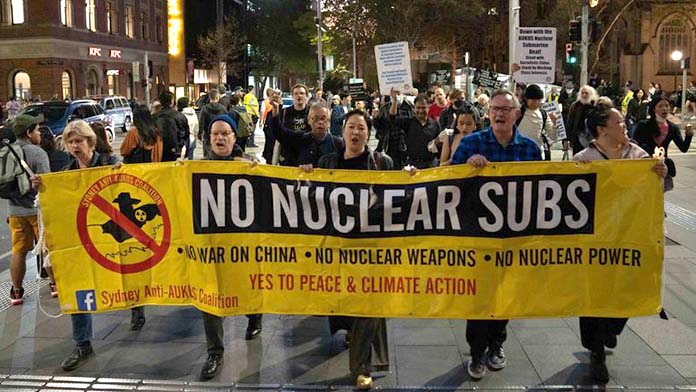Anthony Albanese’s decision to press ahead with buying nuclear submarines despite the astronomical $368 billion cost is a demonstration of his abject commitment to the system.
Paul Keating denounced it as “the worst international decision” by a Labor government since Billy Hughes tried to introduce conscription in 1916. There has been opposition from a series of other mainstream Labor Party figures including Peter Garrett, Gareth Evans and Bob Carr.
Like Scott Morrison and Peter Dutton before him, Albanese is threatening war against a rising China. The subs deal will feed the growing conflict between the US and China—and confirms that Australia would join any war.
The scale of the spending puts the lie to all the claims from Labor that increasing JobSeeker, government investment in climate action or fixing hospitals and schools is unaffordable.
Because the ruling class thinks boosting Australia’s military power is a priority, Labor is willing to find the money, whatever the cost. It is a sign of Labor’s own priorities and its commitment to the interests of the rich and powerful.
But Albanese won’t commit the same kind of spending anywhere else.
Instead of spending on a rapid transition to renewable energy Labor is backing the big mining companies and new coal and gas projects—refusing to ban new projects through its Safeguard Mechanism.
The Liberals’ crushing defeat in the NSW state election means there are now Labor governments in every state and territory except Tasmania.
The Liberals are facing an ongoing crisis and look set to spend years out of office. The party is being consumed by factional turmoil in NSW and their defeat in the Aston by-election shows how deep the problems are.
Peter Dutton is determined to keep the party far to the right even if that means they have no hope of winning back the seven former Liberal seats now held by teal independents.
There is a huge opportunity to bury the Liberals’ legacy. But Albanese remains set against all but the most minor change.
After Labor opened a debate about superannuation tax breaks, it committed to increasing taxes only on those with balances more than $3 million—less than the top 1 per cent of accounts.
This would raise only $2 billion a year when there are $50 billion in tax concessions for superannuation that benefit the rich.
Labor even agreed not to begin the changes until after the next election—saying that voters had another chance to change the government before then. It is still refusing to commit to reversing the stage three tax cuts for the rich—costing $243 billion over a decade.
Albanese says he is taking a risk over the Voice to Parliament, where the Liberals are refusing to offer support. Historically, referendums have rarely succeeded without bipartisan support as they require not just an overall majority but a majority in four out of six states.
But a Voice to Parliament would bring little actual change. Even Albanese admits it is only a “modest request” for consultation—without the power to actually control funding or services, or stop government decisions.
Deals in parliament
The Greens have negotiated changes to Labor’s climate Safeguard Mechanism to try to make it harder to open new coal and gas projects by restricting the use of offsets. But new projects can still go ahead if overall emissions under the scheme don’t rise.
This is far short of the Greens’ demand for a total ban on new coal and gas projects. Many, like the Pilliga gas project, will still go ahead. Labor’s incoming Environment Minister in NSW Penny Sharpe has said there is no chance it would revoke the project’s approvals.
New coal and gas mines have to stop for the world to have any chance of avoiding climate catastrophe. It is going to take grassroots organising and protests to achieve this.
About 1000 joined the Climate Strike in Sydney and hundreds in Canberra and Perth in early March in the largest climate protests since the election.
There needs to be far more protest and resistance to force real change. The AUKUS deal has revealed just how conservative the Labor government is, and how out of step with unions and even its own membership.
There has been a flurry of Labor branch motions against the deal. Opposition to it needs to be raised at every union branch and conference.
An anti-war meeting of 400 people was held at Marrickville Town Hall the weekend after the deal was announced.
The May Day march in Port Kembla, the likely site for an east coast submarine base, will focus on opposition to it. The Quad meeting, when the leaders of the US, Japan and India are visiting on 17 May, will be another opportunity for protest.
It is mass movements, protests and strikes that are needed for real change, not negotiations in parliament.






